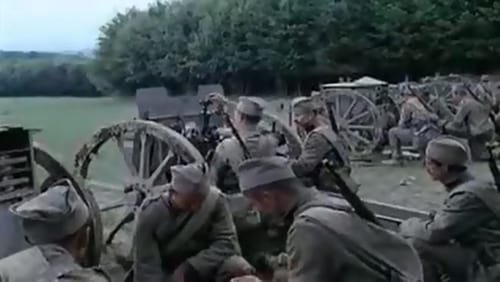
The First World War, a pivotal event in shaping modern Europe, has been conspicuously absent from the narrative of Yugoslav cinema. This oversight is particularly striking given that the formation of Yugoslavia was direct result the war. The reluctance of filmmakers in the post-World War II Communist era to address this topic can be attributed to several complex factors. Notably, the two halves of what would become Yugoslavia found themselves on opposing sides during the conflict, a reality that could undermine the official state policy of “Brotherhood and Unity.” Consequently, films portraying the war are exceedingly rare, making March on the Drina, directed by Živorad “Žika” Mitrović in 1964, a unique entry in this cinematic landscape. The film, however, became known not primarily for its grand spectacle or meticulous historical accuracy but rather for an amusing minor detail that emerges towards its conclusion.
March on the Drina focuses on the Battle of Cer, which holds significance as both the first major battle and the first substantial Allied victory of World War I. This film was produced to commemorate the 50th anniversary of this crucial event. It serves as a reminder of Serbia's military history and its role within the broader context of the war.
The film opens with evocative images of krajputaši, roadside cenotaphs typical of Western Serbia, often depicting fallen soldiers akin to those who represent the protagonists in the narrative. The plot unfolds on July 26, 1914, in Belgrade, shortly after Serbia received an ultimatum from Austria-Hungary following the assassination in Sarajevo. Although Serbia had emerged victorious in both the First and Second Balkan Wars, it was left exhausted and vulnerable. Nevertheless, the Serbian government resolutely rejected the ultimatum, leading to military mobilisation. Among those called to serve is Captain Kosta Hadživuković, affectionately known as “Bata Kole,” portrayed by Aleksandar Gavrić. His close friend, Lieutenant Veselin “Veca” Hadživuković (played by Nikola Jovanović), defies his wealthy banking family's wishes to join him at the front—his family having previously arranged for him to serve far from danger during earlier conflicts.
Once mobilised, the Serbian army finds itself on the defensive, bracing for an inevitable assault from Austro-Hungarian forces that outnumber and outgun them. On August 14, 1914, in Aranđelovac, Major Kursula (played by Ljuba Tadić) expresses his belief that Austro-Hungarians will attack from the west by crossing the River Drina rather than from the north—a prediction that ultimately proves accurate as Serbian forces are redirected westward to confront them at Mt. Cer.
The screenplay for March on the Drina, written by Arsen Diklić—known for acclaimed works such as Don't Look Back, My Son and television series like Salaš u malom ritu—is loosely based on actual events and survivor testimonies from the battle. Diklić's meticulous attention to detail enhances the film's authenticity. Notably, while much of the narrative focuses on Bata Kole’s unit's march towards battle, it allows for character development among a diverse cast representing various backgrounds and social standings.
Diklić’s realistic portrayal is evident in his unromantic depiction of Serbian soldiers as ordinary individuals with flaws rather than heroic figures often glorified in nationalist propaganda. While Veca embodies noble ideals—ultimately meeting a tragic fate—most of his comrades express reluctance about going into battle. Characters like Private Bogi Petrović (played by Zoran Radmilović) indulge in vices but lack enthusiasm compared to Kursula—an exaggerated character whose penchant for drinking and womanising is matched only by his coarse language.
Kursula delivers one of cinema's most memorable lines at the film's conclusion—a four-letter word previously unheard in Yugoslav cinema or even world cinema at large. Ljuba Tadić later recounted that he improvised this line as a joke; he was astonished when Žika Mitrović chose to retain it in the final cut. Tadić's performance earned him a Golden Arena for Best Actor at the Pula Film Festival, marking March on the Drina as a significant milestone in Yugoslav cinema where films began to shed their “proper” and “polite” façades—a trend mirrored across global cinema during the 1960s.
Žika Mitrović transitioned from comic book artistry to film direction, specialising in commercial genres such as thrillers and historical epics. He adeptly managed Diklić’s screenplay and collaborated with Yugoslav People’s Army resources to recreate the Battle of Cer competently. The film captures a time when World War I had not yet settled into its infamous trench warfare; battles often erupted unexpectedly from minor skirmishes into chaotic engagements—a reality illustrated when two Serbian soldiers inadvertently stumble into an Austro-Hungarian camp.
While generally well-directed, March on the Drina occasionally exhibits rough edges; certain scenes intended to depict night may appear unconvincing due to poor execution. The musical score by Vasilije Mokranjac is solid overall; however, it is particularly notable for its incorporation of Stanislav Binički’s famous composition written in 1914 to celebrate Serbian victories—a piece that has since become one of Serbia’s most cherished patriotic songs.
March on the Drina stands out as an engaging and occasionally thought-provoking reconstruction of history that sheds light on one of World War I's less explored episodes. Through its blend of character-driven storytelling and historical context, it offers viewers insight into both military strategy and human experience during a tumultuous time.
RATING: 7/10 (+++)
Blog in Croatian https://draxblog.com
Blog in English https://draxreview.wordpress.com/
InLeo blog https://inleo.io/@drax.leo
Hiveonboard: https://hiveonboard.com?ref=drax
InLeo: https://inleo.io/signup?referral=drax.leo
Rising Star game: https://www.risingstargame.com?referrer=drax
1Inch: https://1inch.exchange/#/r/0x83823d8CCB74F828148258BB4457642124b1328e
BTC donations: 1EWxiMiP6iiG9rger3NuUSd6HByaxQWafG
ETH donations: 0xB305F144323b99e6f8b1d66f5D7DE78B498C32A7
BCH donations: qpvxw0jax79lhmvlgcldkzpqanf03r9cjv8y6gtmk9
Posted Using INLEO